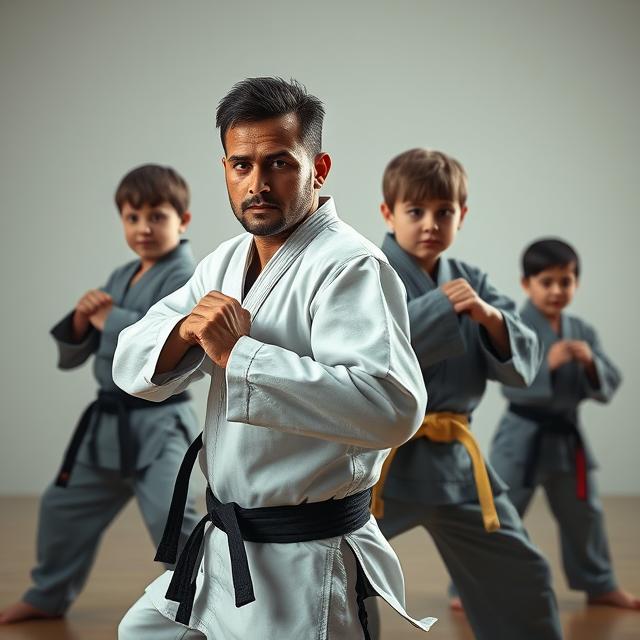Technique and Benefits of a Versatile Martial Arts Skill
Tang Soo Do, a traditional Korean martial art, is renowned for its emphasis on precision, discipline, and fluidity of movement. Among the myriad of kicks it offers, the inside-to-outside chop kick stands out for its versatility and effectiveness, making it a valuable tool in both practice and self-defense. This article delves into the mechanics of the kick, its proper execution, and the reasons why it is an indispensable skill for martial artists.
Understanding the Inside-to-Outside Chop Kick
The inside-to-outside chop kick, also known as an inward crescent kick, is characterised by its sweeping motion that starts from the centerline of the body and arcs outward. The kick targets areas such as the opponent’s head, shoulders, or hands, depending on its height and precision. When performed correctly, it combines speed and rotational force to deliver a strike that is difficult to anticipate and block.
Step-by-Step Execution
To master this kick, practitioners must focus on proper form, balance, and timing. Here is a detailed breakdown of its execution:
1. Starting Position
Begin in a fighting stance, with your dominant foot slightly behind and your weight evenly distributed. Keep your hands up to guard your face and torso, ensuring a stable and defensive posture.
2. Pivot and Chamber
Shift your weight onto your supporting leg while pivoting slightly for balance. Simultaneously, chamber your kicking leg by bending your knee and bringing your foot inward toward your centreline. The chamber is crucial as it sets the trajectory for the chop kick.
3. The Arc Movement
From the chambered position, extend your leg outward in a sweeping arc. The motion should be fluid and controlled, with your foot slicing through the air in an outside direction. Engage your hips to add rotational power to the kick, ensuring that it flows seamlessly from start to finish.
4. Impact Point
The outer edge of your foot or the ball of your foot typically makes contact with the target. Focus on precision rather than brute force, aiming to strike cleanly and effectively.
5. Recovery
After the kick has been executed, quickly retract your leg to a safe position. Resume your fighting stance, maintaining awareness of your surroundings. The recovery phase is as important as the kick itself, as it prepares you for follow-up movements or defense.
Common Mistakes to Avoid
Despite its elegant simplicity, the inside-to-outside chop kick can be challenging to perfect. Here are some common pitfalls and how to address them:
- Overextension: Avoid overextending your leg, which can compromise balance and reduce power. Focus on controlled movements.
- Neglecting the Chamber: Skipping the chamber phase can result in a weak and ineffective kick. Always take time to properly chamber your leg.
- Poor Targeting: Ensure that your eyes remain fixed on your target throughout the motion to improve accuracy.
- Rigid Movement: The kick should be smooth and natural, not stiff. Engage your core and hips for fluidity.
Why This Kick Is Useful
The inside-to-outside chop kick offers a range of benefits that make it a standout technique in Tang Soo Do:
1. Versatility
This kick can be adapted to various scenarios, whether in sparring or self-defense. Its sweeping motion allows it to bypass traditional blocks and reach unexpected angles, making it suitable for targeting different areas of an opponent’s body.
2. Enhances Flexibility
Practicing this kick regularly improves the flexibility of the legs and hips. This increased range of motion benefits overall mobility and enhances other kicking techniques.
3. Builds Coordination
The precision required for the inside-to-outside chop kick sharpens coordination and timing. It teaches practitioners to synchronize movement with intent, a skill that translates across all martial arts forms.
4. Strategic Defence
The kick’s arc can be employed defensively to create distance between the practitioner and an opponent or to disarm an incoming strike aimed at the upper body.
5. Aesthetics and Discipline
Executed flawlessly, the inside-to-outside chop kick is visually striking and embodies the grace and discipline of Tang Soo Do. Performing it with focus and control reinforces the mental aspects of martial arts training.
Conclusion
The inside-to-outside chop kick is more than just a physical technique; it is a testament to the artistry and strategy inherent in Tang Soo Do. By mastering its execution and understanding its applications, martial artists can add a dynamic and effective skill to their repertoire. Whether used in sparring, self-defense, or demonstration, this kick exemplifies the balance of power, precision, and elegance that defines the martial art. Through diligent practice and attention to detail, practitioners can ensure that this fundamental skill becomes an integral part of their Tang Soo Do journey.


